‘War is Peace, Freedom is Slavery, Ignorance is Strength’
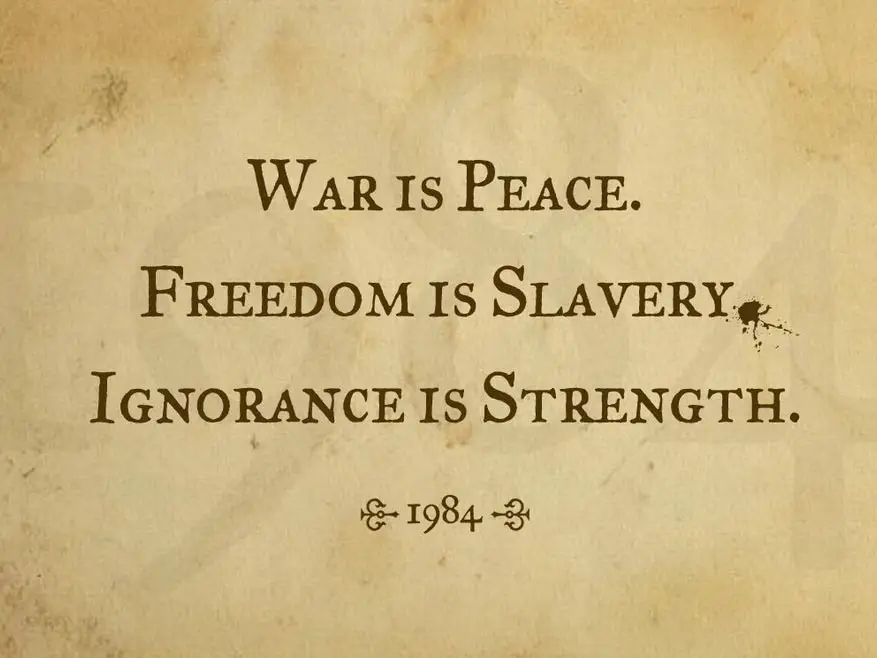

‘War is Peace, Freedom is Slavery, Ignorance is Strength’ (img by abhijitdara)
Some two years ago I wrote this post defining what a paradox is and how it is used on this website. In there, I also gave as an example of paradoxes Orwell’s well-known quotations, appearing in all kinds of articles: ‘War is Peace, Freedom is Slavery, Ignorance is Strength’. It is, I think, high time to return to an idea from two years ago, and give my take on these paradoxical statements. It is assumed that the reader has read the book, but I will try to keep it as general as possible in case you have not.
Brief overview
The three statements appear as slogans of the English Socialist Party (INGSOC), which is running what is called Oceania. We of course know that Orwell is ultimately very critical of the aims of INGSOC (it is totalitarian, etc.), but there is also a particular reason that is of interest in relation to these slogans why he is critical. In a section of [amazon asin=8172345143&text=Nineteen Eighty-Four], Orwell present INGSOC as a party that aims to control all knowledge, meaning and value that are invested in our actions. All our individuality is absorbed into the Party – we become a singular collective mind where difference is not possible. That is to say: what is real is only real insofar INGSOC says it is real.
INGSOC achieves this with what Orwell calls ‘doublethink’. It becomes possible for the people to believe both the truth and the falsity of statements (without resorting to contradictions1) – they thus believe both the historical reality, as well as the created collective reality that is the new past. In Orwell’s words:
To know and not to know, to be conscious of complete truthfulness while telling carefully constructed lies, to hold simultaneously two opinions which cancelled out, knowing them to be contradictory and believing in both of them, to use logic against logic, to repudiate morality while laying claim to it, to believe that democracy was impossible and that the Party was the guardian of democracy, to forget whatever it was necessary to forget, then to draw it back into memory again at the moment when it was needed, and then promptly to forget it again, and above all, to apply the same process to the process itself – that was the ultimate subtlety: consciously to induce unconsciousness, and then, once again, to become unconscious of the act of hypnosis you had just performed. Even to understand the word ‘doublethink’ involved the use of doublethink (George Orwell, [amazon asin=8172345143&text=Nineteen Eighty-Four], p. 32).
We thus get to another often-quoted passage, ‘He who controls the past controls the future. Who controls the present controls the past.’ Through various institutions, the mind of the people becomes ingrained into the collective mind that is INGSOC. The whole continent can thus claim and believe all manners of contradictions – hence our slogans: ‘War is Peace, Freedom is Slavery, Ignorance is Strength’.
The meaning of ‘War is Peace, Freedom is Slavery, Ignorance is Strength’
Keeping in mind that the aim of INGSOC is to control the minds of individuals through doublethink, we can see the contradictory statements for what they are beyond the obvious paradox.
Especially the first two slogans – War is Peace and Freedom is Slavery – fit to this category of contradiction. But they also exemplify why doublethink is an important tool for Orwell. After all, without doublethink, it is impossible for the people to believe the contradictions. So Orwell’s reliance on doublethink already shows the paradoxical nature of the statements – he is fully aware that it would be impossible to accept these statements for the reader without introducing something that controls the thought process. The Party thus introduces this programme for both the people of Oceania as well as the reader. This is an important notion for us, because we already believe, at least on certain occasions, that War is Peace.
Contemporary application – War is Peace
Let us look at these seemingly contradictory slogans more closely, starting with War is Peace. The importance of this today is not to be underestimated. While for Orwell, Oceania is in a constant state of war, its citizens act as if in a situation of peace. Their emotional state regarding both war and peace is controlled by the Party to the extent that they can easily switch from one to the other.
We may easily dismiss Orwell as pertaining to totalitarianism (and in no sense do I imply that we, in the West, live under the conditions present in Nineteen Eighty-Four), his overview is not extremely farfetched from our contemporary conditions. Do we not also live in a constant global war, while acting almost entirely with the presumption of peace? Is not our notion of global capitalism reliant on continuous destabilisation of the global order? This may seem farfetched, but consider that from early on in this century (2003 to be precise)2 we had accepted that the only way to achieve peace was by aligning against the enemy and waging war. The costly war in Iraq (which to this day counts 251,000 causalities according to the Iraq Body Count; and reaches the number of 1,2000,000 casualties if considering the ORB Survey3), if anything, shows us precisely that we often let our emotions be controlled by state institutions. We give in to the collective mind and accept the paradoxical slogan – such as War is Peace.
The Iraq War is of course not unique by any measure. George W. Bush’s announcement of ‘pre-emptive war’ is precisely what is at stake here: the term itself is paradoxical because it already assumes the Orwellian War is Peace. Pre-emption entails starting a war for the purpose of preventing – a paradoxical statement which has been, unfortunately all-too-easily, accepted by our collective mind in 2003.
Contemporary application – Freedom is Slavery
Similarly, the contemporary application of Freedom of Slavery is the less perverse version of the slogan above the doors to Auschwitz: Arbeit macht Frei. I want emphasise once again, in no sense do I imply that our conditions are even close to those of totalitarian states. My claim is that they are the more benign variations of the same symptom. So in what sense does Freedom is Slavery apply to our conditions? Precisely in the sense that contemporary capitalist logic only functions for as along as there is wage labour. It is through work – hard work! – that we may become free: enjoy our holidays in the sun, buy products that simplify our life, etc. But of course also in the more mundane sense that in order to live as such – to be able to sleep under a roof or eat a loaf of bread, and so on – we have to offer our labour in return for freedom.
Consider especially that the conditions of our freedom, limited as that freedom may be, relies fully on the labour of others. There is no need to recount once again the often-cited conditions of Chinese workers at Foxconn, and of course countless similar examples globally, including the USA. As Slavoj Zizek noted in a recent article:
Tim Cook can easily forget about hundreds of thousands of Foxconn workers in China assembling Apple products in slave conditions; he made his big gesture of solidarity with the underprivileged, demanding the abolition of gender segregation… As is often the case, big business stands proudly united with politically correct theory.
One only needs to add what is implied: ‘while wholly ignoring the effects of global capitalism’ – that is, these slave conditions of the Chinese worker create that freedom for us to demand the abolition of gender segregation.
Contemporary application – Ignorance is Strength
The last slogan may not be as paradoxical as the previous two. There is a certain level of ignorance that we even admire – e.g. in such sayings as ‘the fool and his smile’, or the current trend of emphasising how hard it is to live as a smart person (sidenote: this is of course a true statement of being an idiot). For Orwell, the last slogan encouraged the acceptance of the Party line as factual without asking for reasons or purposes, and especially without questioning INGSOC as such. Are we not confronted with similar attitude almost on a daily basis?
“Let me do my job and you do yours” ; “It is in your interest that we do X” ; “Brussels technocrats/experts have come to a conclusion that …” ; “Studies show” or “A growing body of evidence …” and similar ‘weasel words’ ; “Our financial experts / legal team / etc. have concluded that …” ; etc.
The idea is simple: do not question, accept! It is better to be a fool than to resist. Perhaps the best example of this is in Robert Zemeckis’s very popular [amazon asin=B0035QUXWQ&text=Forrest Gump] (1994). In Zizek’s analysis, Forrest Gump is
this perfect ‘vanishing mediator’, the very opposite of the Master (the one who symbolically registers an event by nominating it, by inscribing it into the big Other): Gump is presented as the innocent bystander who, by just doing what he does, unknowingly sets in motion a shift of historical proportions. When he visits Berlin to play football, and inadvertently throws the ball across the wall, he thereby starts the process which brings down the wall; when he visits Washington and is given a room in the Watergate complex, he notices some strange things going on in the rooms across the yard in the middle of the night, calls the guard, and sets in motion the events which culminated in Nixon’s downfall (Slavoj Zizek, [amazon asin=1844673014&text=The Ticklish Subject], p. 338).
To put this differently, is not the idiot Forrest Gump not only the symbol of success (he becomes rich, he gets the girl, etc.), but also what is expected from a true actor4 under current conditions: do not question the current status quo, just accept and let things unveil themselves! Contrast this with his life-long love Jenny, who is immersed in the protest movements, who aims educate herself, to acquire an understanding of what is social justice, etc. – isn’t she, for her efforts to go beyond ‘ignorance’, punished by repeated violence? She is beaten by her father (with a strong implication of being molested), then by bullies who pick on Forrest before he ‘learns’ to run, she gets into abusive relationships, etc. Until, of course, the director who functions as the representative of the liberal ideological hegemony decides to close the circle of violence by killing her with AIDS.5 That is to say, Jenny’s will to resist our third slogan – Ignorance is Strength – is punished by a lethal virus.
So to briefly conclude on where we started; the three slogans in Orwell’s [amazon asin=8172345143&text=Nineteen Eighty-Four] are meant to encompass the individual in a collective mind that is the totalitarian state. But the statements themselves overreach the specificity of Orwell’s fictional Oceania and apply to contemporary Western societies.
Sign up for Paradox of the Day mailing list and please visit our Patreon support page.
- This is an illuminating passage: “The power of holding two contradictory beliefs in one’s mind simultaneously, and accepting both of them… To tell deliberate lies while genuinely believing in them, to forget any fact that has become inconvenient, and then, when it becomes necessary again, to draw it back from oblivion for just as long as it is needed, to deny the existence of objective reality and all the while to take account of the reality which one denies – all this is indispensably necessary. Even in using the word doublethink it is necessary to exercise doublethink. For by using the word one admits that one is tampering with reality; by a fresh act of doublethink one erases this knowledge; and so on indefinitely, with the lie always one leap ahead of the truth.” (George Orwell, Nineteen Eighty-Four, p. 220)
- In order to remain complete, I am not only reproaching the West; the same logic applies to the terrorist bombings – in order to achieve peace, they must create dirty bombs and place them under cars, etc. as was the case with the IRA; or fly planes into buildings as was the case with Al-Qaida.
- The ORB Survey results are questionable, cf. this article by Iraq Body Count.
- That is, a true political actor that the current condition supports/allows.
- And of course I mean precisely the director, Jenny does not die in the book.
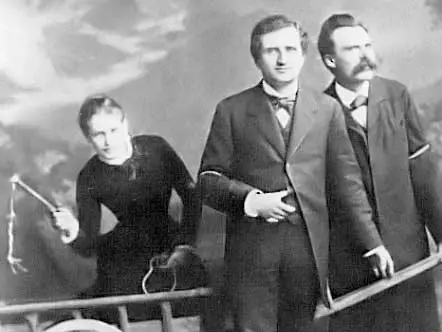
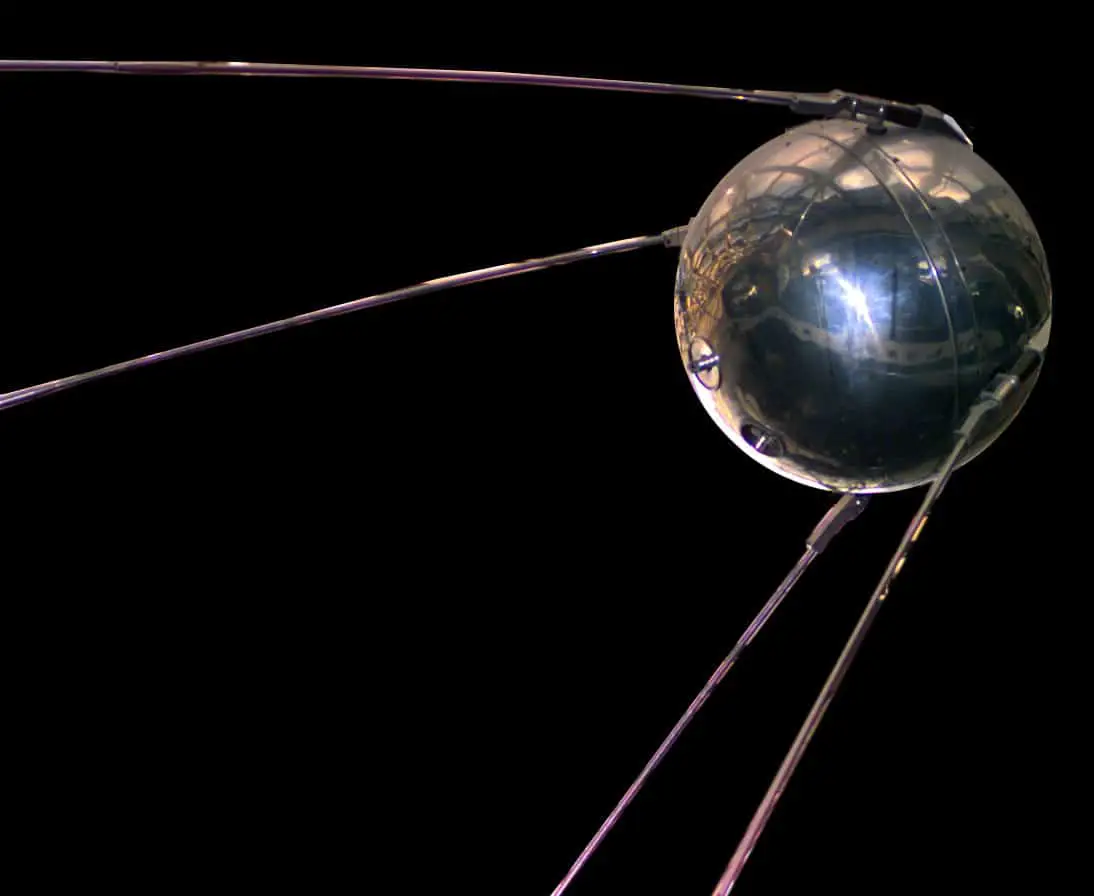
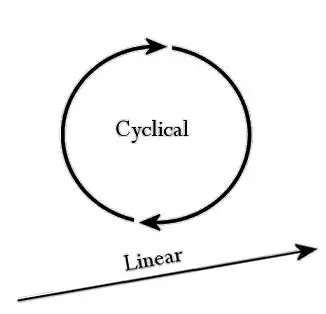

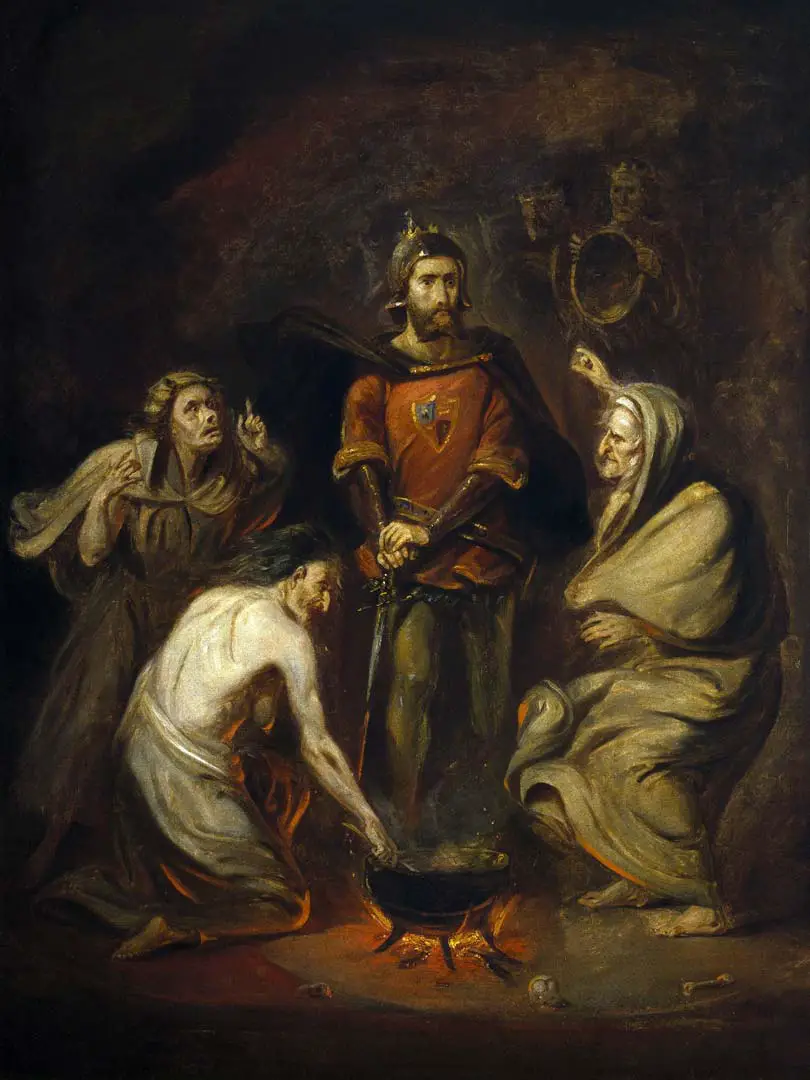
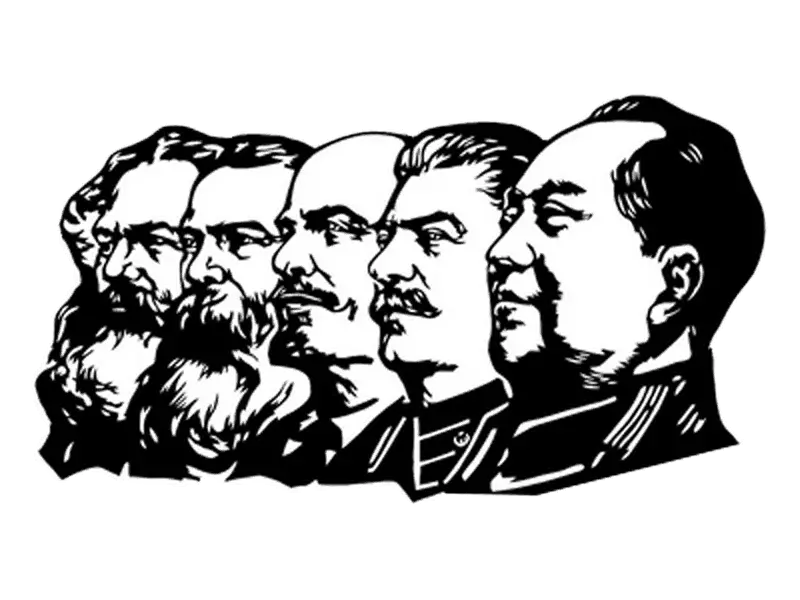
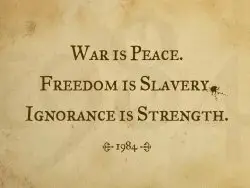

Very good analysis. I particularly appreciated your applying “war is peace” to the present. So many confine analysis of the slogans to the parameters of the novel itself and it annoys me: Orwell owned “1984” was a logical extrapolation of the future based on 1948 world governance.
Did you follow through and apply “freedom is slavery” and “ignorance is strength” to the present? I’d appreciate a link if you have.
I think you missed the second page, which admittedly is not very clear (I should talk to my developer about this) but yes I did – you can find it here: https://paradoxoftheday.com/war-is-peace-freedom-is-slavery-ignorance-is-strength/2/